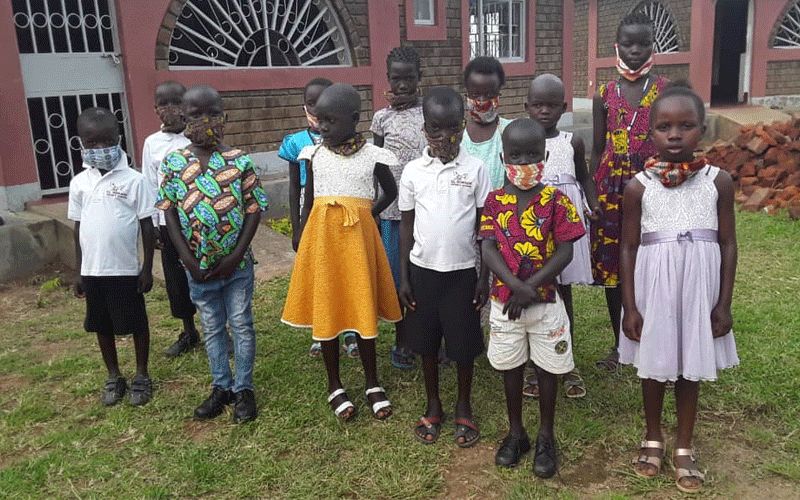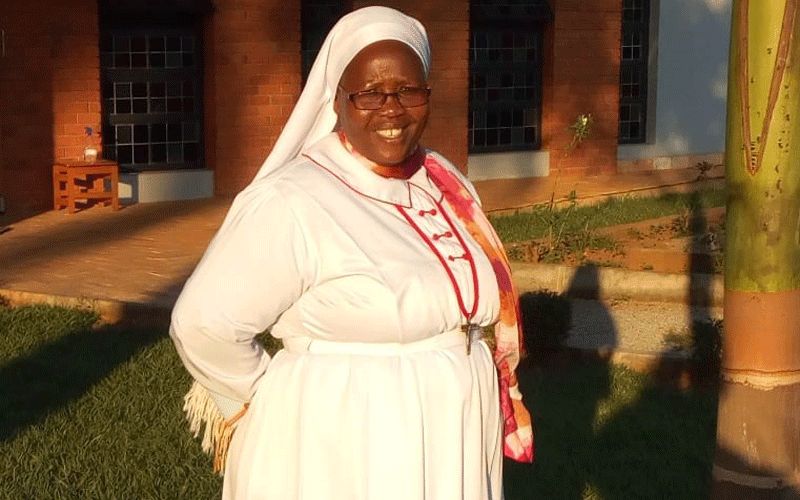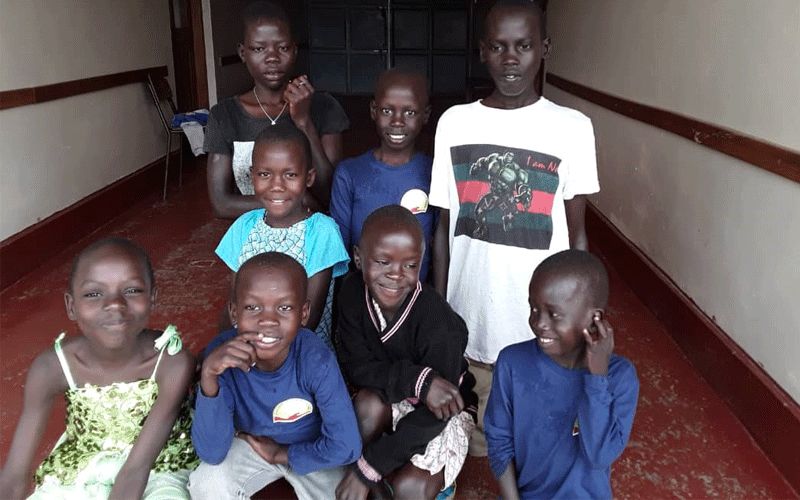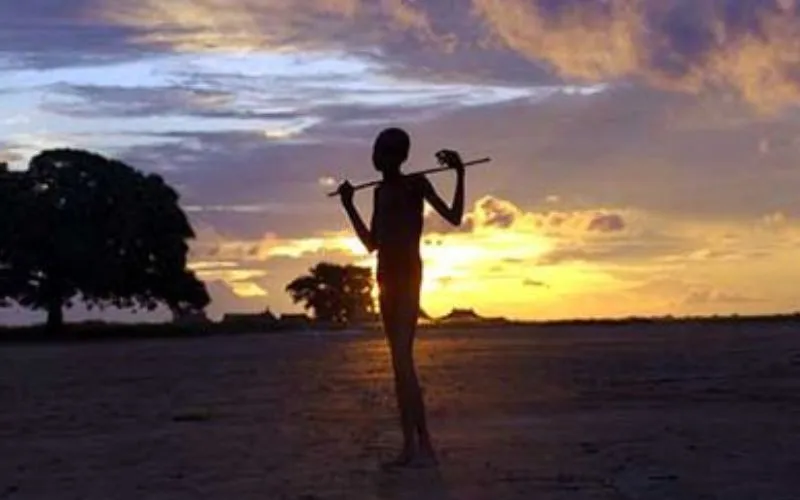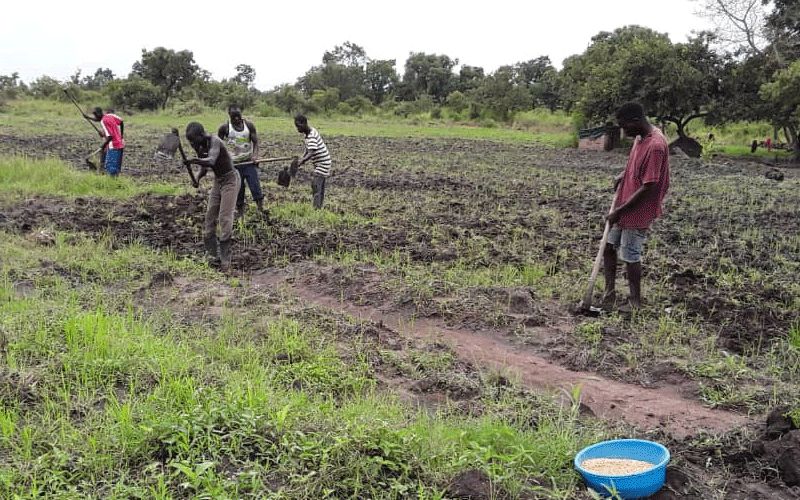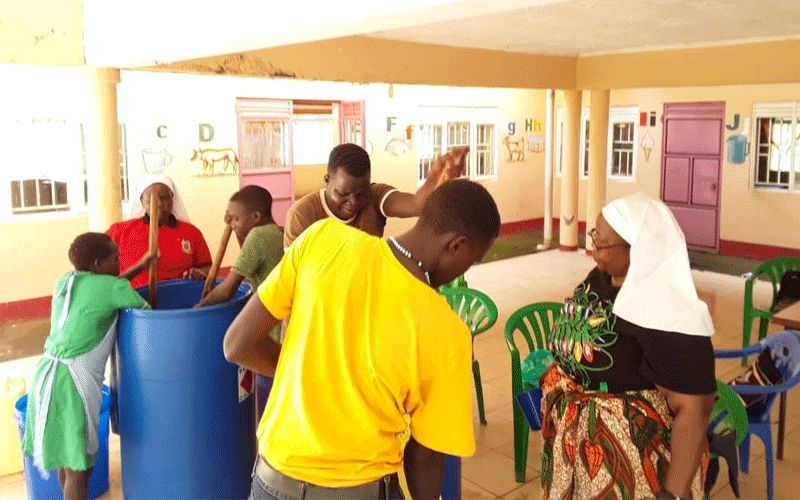And when Sr. Pasqua spoke to ACI Africa on Thursday, August 27 interview, she said the orphanage had made another 1,600 face masks, which were to be distributed to beneficiaries.
“In three weeks’ time, we shall be distributing about 2,000 face masks together with over 3,000 litres of liquid soap to the refugees in the camp. It is such a beautiful gesture. Talk about the poor reaching out to help the poorest,” said the 56-year-old nun who has been ministering among refugees in Uganda for the past 15 years.
“We also do some farming to provide food for the orphanage and our formation house and take the rest of the food to the refugees back at the camp,” she said.

This way, Sr. Pasqua said, the orphanage stays true to its inspiration at conception, close to 30 years ago.
(Story continues below)
“When we started the orphanage in 1991, our target was the hundreds of South Sudanese children who moved around from one camp to another and roamed streets with no one taking care of them,” she told ACI Africa, adding that in the 1980s at the height of violence in Africa’s youngest nation, many children who sought refuge in Uganda were orphaned.
At the orphanage, the children are enrolled in schools from kindergarten to tertiary institutions. So far, about 300 children at the orphanage have gone through training in universities and middle-level colleges.
Additionally, the orphanage provides child protection, counselling and psychosocial support to children who come to the facility with memories of violence from their home countries.

In the August 27 interview, the SHS member said that at the moment, 46 out of the 96 children housed at the orphanage are refugees aged between 7 and 17 years.
The orphanage is the brainchild of Sr. Rosemary Nyirumbe, an award-winning Uganda-born nun who also founded the popular St. Monica Girls’ Training Center where she has journeyed with the ex-wives and children of the infamous Lord’s Resistance Army (NRA) after they were written off by society owing to many years of terrorizing the northern part of Uganda.
At St. Monica Girls’ Training Center founded in 2002, Sr. Rosemary admitted and restored the dignity of the underage mothers by offering them hands on business skills, secretarial studies, sewing and catering. So far, more than 2,000 girls have gone through the skills-training and have been hired by top recruiters in the country.

In an interview with ACI Africa in March, just after Sr. Rosemary was nominated for the 2020 Varkey Foundation Global Teacher Prize, the most coveted award in the teaching profession, the 64-year-old Ugandan-born nun said the money in the Global Teacher Prize package had already been planned for, should she win it.
“I will use the prize money to build libraries in all my schools and support students who cannot afford learning materials. I also recently initiated a project to build an agricultural college, which will boost the production of crops to sustain the school and raise further income. Only money stands in the way of achieving the goals of this project,” she told ACI Africa in March.
And while Sr. Pasqua sees the running of the projects on the ground, the Orphanage’s founder, Sr. Rosemary tours the globe looking for any available sources of funding.

“I have been coordinating and looking for funding for our projects. Our children are engaged in the process where they are taught the value of work,” she told ACI Africa from the United States where she is pursuing further studies and added, “I take my staff on a weekly zoom conference where I give them health education.”
Additionally, she said, the school has created jobs for teachers who had been idle since March when COVID-19 lockdown was declared in Uganda.
The teachers, she said, engage in the making of the liquid soap and facemasks, as well as farming and earn some money while at it.
Immaculate Ayeronimungu has grown from being a student at St. Monica Girls’ Tailoring School where she was given a chance in 2002 when she was only 12 and on the streets in Kampala to an instructor at the school.
Before COVID-19 struck, Immaculate made money on the side by sewing for her clients.

“It hasn’t been easy since lockdown was declared in March. We haven’t had school and there were no clients. I sometimes couldn’t afford to pay my rent,” the single mother of one told ACI Africa.
“But then, Sr. Rosemary brought this face mask project to cushion us and it has really helped. I even brought my sister and we are making some money from making the facemasks. Once more, Sr. Rosemary and Sr. Pasqua have saved me. I am really grateful to both sisters,” Immaculate said.
Agnes Aineah is a Kenyan journalist with a background in digital and newspaper reporting. She holds a Master of Arts in Digital Journalism from the Aga Khan University, Graduate School of Media and Communications and a Bachelor's Degree in Linguistics, Media and Communications from Kenya's Moi University. Agnes currently serves as a journalist for ACI Africa.
